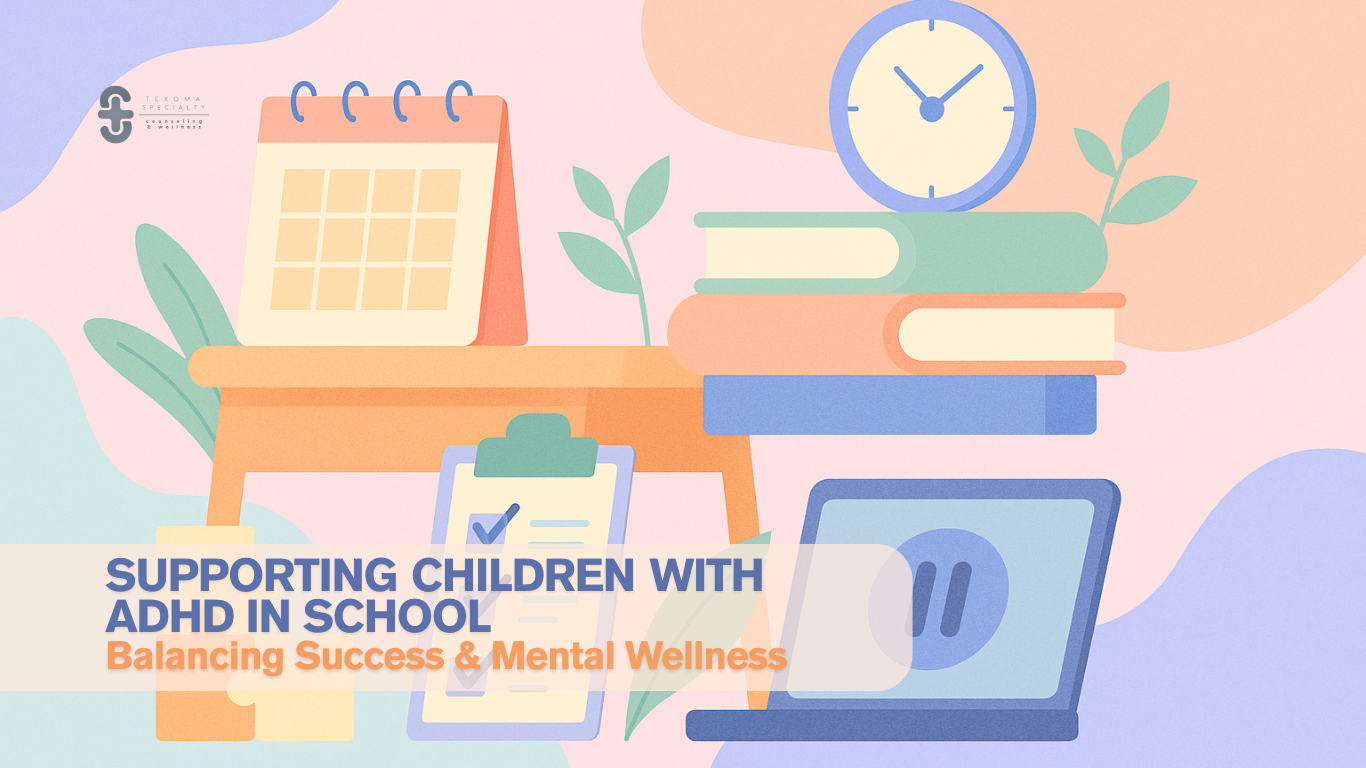Supporting Children with ADHD in School
Balancing a Child’s Success & Mental Wellness
Supporting children with ADHD in school requires a thoughtful approach that balances academic success with mental wellness. Youth and adolescent mental health is a growing concern, as many young people face challenges such as anxiety, depression, and stress.
For children with ADHD, these challenges are often intensified due to difficulties with attention, impulsivity, and emotional regulation, making school environments particularly demanding.
Supporting children with ADHD in school requires a thoughtful approach that balances academic success with mental wellness. Youth and adolescent mental health is a growing concern, as many young people face challenges such as anxiety, depression, and stress. For children with ADHD, these challenges are often intensified due to difficulties with attention, impulsivity, and emotional regulation, making school environments particularly demanding.
How ADHD Impacts School Life 🎒
ADHD can affect a child’s ability to stay organized, follow instructions, and manage time effectively, which can lead to frustration and lower self-esteem. Beyond academics, social interactions and emotional well-being can also be impacted, increasing the risk of isolation or behavioral issues.
Children with ADHD may struggle with:
Staying organized
Following instructions
Managing time effectively
The Digital Dimension: Social Media & Screen Time 📱
The pervasive influence of social media and digital environments adds another layer of complexity. Constant connectivity and exposure to curated online lives can heighten anxiety, disrupt sleep, and contribute to feelings of inadequacy. Many schools have implemented cell phone bans during class time to minimize distractions and promote focus, but the impact of digital overload extends beyond the classroom.
The influence of social media and digital environments adds another layer of complexity. Constant connectivity can:
Heighten anxiety
Disrupt sleep
Contribute to feelings of inadequacy
Many schools have banned cell phones during class time, but digital overload extends beyond the classroom. Parents can help by:
Setting clear screen-time boundaries
Creating tech-free zones (during meals, before bedtime)
Having open conversations about social media’s effects
Parents can play a crucial role in supporting their children by setting clear boundaries around screen time and encouraging balanced use of technology. Establishing tech-free zones or times at home, such as during meals or before bedtime, helps reduce overstimulation and promotes healthier habits. Open conversations about social media’s effects can empower children to recognize and manage negative emotions tied to online experiences.
Practical Strategies for Parents & Schools 📝
For children with ADHD and other neurodivergent or mental health concerns, extra support and intervention are often necessary. Collaborating with teachers, counselors, and healthcare providers to create individualized plans can address academic and emotional needs. Strategies such as breaking tasks into smaller steps, using visual schedules, and incorporating movement breaks can improve focus and reduce overwhelm.
Helpful strategies include:
Breaking tasks into smaller steps
Using visual schedules
Incorporating movement breaks to reduce overwhelm
Encouraging mindfulness practices
Teaching coping skills for emotional regulation
Encouraging mindfulness practices and teaching coping skills also bolster resilience and emotional regulation. Above all, fostering a supportive home environment where children feel understood and valued helps them navigate school challenges with greater confidence.
Building a Supportive Environment 🏡
Above all, children with ADHD thrive when they feel understood and valued. At home, parents can:
Provide encouragement and celebrate small wins
Foster open communication
Create consistent routines
Reinforce strengths rather than focusing only on challenges
The Bigger Picture 🌈
Supporting youth mental health, especially for those with ADHD, requires a comprehensive approach that includes awareness of digital influences and proactive strategies at home and school. With the right tools and support, children can thrive academically and emotionally, building a foundation for lifelong wellness.
👉 Learn more about ADHD support and youth mental health at Texoma Specialty Counseling & Wellness.
Contact us today or sign up for our free newsletter for expert insights and a complimentary digital wellness guide. 💙


